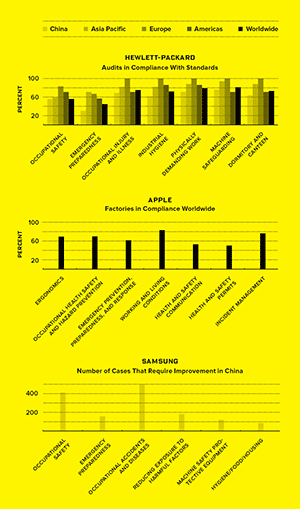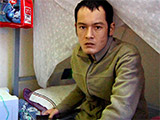Changes to China's workers' compensation system require companies to pay into a fund and then pay a portion of an injured worker's salary, living expenses, and medical care. So companies now have a motive to deny that workers were injured on the job. Government corruption and interference cause further delays and setbacks for patients, who are often left struggling to pay for treatment out of pocket for years or are trapped in lengthy legal fights. Many Chinese factories are still unsafe, and a tangled health care system prevents workers from getting help. Put simply, China's tech-factory workers are getting red-taped to death.
During the Foxconn Scandal,
analysts connected unsafe conditions to the demand for cheap devices in the West. “A huge issue is how companies walk the line between trying to get the best financial performance and also achieving high safety standards,” says Kate Cacciatore, former corporate responsibility director at STMicroelectronics. “There is a constant pressure on companies to cut costs, and that pressure works itself down the supply chain.” Cacciatore is a former board member of the Electronic Industry Citizenship Coalition, a group of 105 electronics companies formed in 2004 in response to criticism of conditions at contract manufacturers. Their code of conduct requires that member companies monitor and control chemical exposure and other risks. But the EICC doesn't set specific numeric standards, instead deferring to local laws. That's quite a loophole. Member companies complete a self-assessment to identify the greatest areas of hazard and, to complete admission, the EICC assigns an auditor. The group has never expelled a member for failing to live up to its code. Also, EICC standards apply only to suppliers that represent 80 percent of a company's total spending. That's most likely the first tier of contractors in the supply chain—companies that make or assemble components for member companies—or the second- or third-tier suppliers, contractors to the contractors. Companies further down the line aren't monitored.
Even figuring out who those companies are turns out to be problematic. Four workers at Fangtai Huawei said they worked on products for Nokia, Samsung, and Chinese electronics giant TCL during their time at the factory. Long claims she worked on Apple products. Other workers said they physically delivered products to companies that supply Apple, Samsung, TCL, and Microsoft.
But did the company actually make products for those big-name clients? Fangtai Huawei representatives denied requests for an interview. The Chinese technology industry is rife with counterfeits and copyright violations; it's possible the workers at Fangtai Huawei saw logos on fakes. Interrelationships along the supply chain in China are byzantine. In theory, workers compensation law protects Chinese employees, but in practice, abuses prevail. Considering Apple's reputation for precise control of its supply chain, it's nearly impossible to imagine the company doesn't know who makes the screens for its flagship product. Chris Gaither, Apple's director of corporate public relations, says the company scoured its contractor database and found no mention of Fangtai Huawei. Apple also queried Foxconn, and the manufacturing giant denied having any business with Fangtai Huawei. Samsung representatives said the company has “no relationship” with the manufacturer. Microsoft acquired Nokia's cell phone division in 2014, but a spokesperson at Microsoft referred our questions to Nokia, and Nokia's spokesperson said the company had not been a supplier since 2004. TCL didn't respond to our request for comment. But Fangtai was making screens for someone.
Apple is particularly sensitive to claims of neglect. The company surpasses EICC standards and has an updated code of conduct and a 100-page list of work requirements for suppliers deep into the supply chain. The Apple Supplier Environment, Health, and Safety Academy, an 18-month program with over 150 hours of training, teaches managers proper risk management and safety standards. And the company performed 633 audits at facilities worldwide in 2014, nearly three times as many as in 2011. Still, Apple's own reports show that 30 percent of its suppliers don't comply with the company's own safety standards and 18 percent fail to comply with standards on hazardous chemical exposure. In fact, the company finds some level of noncompliance in every annual report. But Apple says that's just evidence that the process works—that the company helps its suppliers resolve every violation. “People sometimes point to the discovery of problems as evidence that our process isn't working,” wrote Apple's senior vice president of operations, Jeff Williams, on the company's supplier responsibility website in February. “Nothing could be further from the truth.”
Other investigations have found serious issues with suppliers in China. China Labor Watch, a nonprofit with bases in New York, Sichuan, and Shenzhen, interviewed workers and sent undercover operatives into 14 Apple suppliers in China in 2012 and 2013. Despite Apple's commitment to provide at least 24 hours of safety training, CLW found workers had eight hours at most, and often less. In late 2013, CLW discovered that at least five workers had died at the Shanghai factory of Pegatron, a Taiwan-based supplier producing the iPhone 5c, though CLW couldn't link the deaths to working conditions. Pegatron eventually said it would investigate, though when we asked for the results the company declined to comment. Apple policy is to respond to all specific allegations, and in this case, after sending its own team to the factory, Apple said it found “no evidence of any link to working conditions.” Last summer, reports said that Pegatron would be a supplier of the iPhone 6, producing 30 percent of the phones, with Foxconn producing the rest, and that Pegatron would expand its workforce at one factory by a third to fill the orders.
In 2012, CLW investigated 11 Samsung factories, six of which were majority-owned by the company. While the group found labor violations at all of them, the problems were particularly egregious at some independent suppliers—no safety training, no masks for workers in contact with fumes. Samsung told us that “corrective measures have already been taken” but didn't offer specifics.
Sick Days
Maintaining humane working conditions requires codes that regulate everything from injury prevention measures to dorms and dining facilities. But when HP, Apple, and Samsung— the top three makers of information and communications hardware—conducted audits of their factories, they found plenty of room for improvement.

“I saw my son, but it was not my son. He was in a coma, and his face was swollen, and his eyes were shut. It was like my soul escaped from my body.”
Ming Gaosheng
leads the way down a trash-strewn alley in Shenzhen. Together we climb four flights of stairs to a tiny apartment, where Ming's son Kunpeng pokes his head out of his room. He's stick-thin, wearing red athletic shorts. Green tubes run from his nose to an oxygen tank. Removing them, he sits down on a wooden bed frame in the kitchen, every once in a while interrupting himself with a phlegmy cough. His story is about more than just working conditions. It's about health care for people who get sick or hurt on the job.
In 2007, when he was 20 years old, Ming Kunpeng began working at a factory then owned by Dutch company ASM International—a leading manufacturer of assembly equipment for computer chips, phones, and tablets. For two years, Ming cleaned motherboards with chemicals including benzene, a sweet-smelling and particularly effective industrial solvent and degreaser. It is also a carcinogen. Where people still use it, the International Labour Organization recommends wearing helmets with a face piece blowing clean air and gloves made of Viton, an expensive heat- and chemical-resistant fluoroelastomer. Ming Kunpeng says he was given only masks and standard gloves.
In 2009 he was diagnosed with leukemia from benzene exposure, according to medical records. But as recently as 2013, changes to China's health care system continued to make health care untenable for him—and many others with work-related problems. When the family asked ASM for compensation, the company refused to pay, disputing the cause. They fought for a year, while Ming waited for a bone marrow transplant. In desperation, his family says, they agreed to a onetime settlement in return for dropping their case. Ming got the transplant, but his lung collapsed a few months later, leading to an almost permanent need for an oxygen tank. In 2011 he was hospitalized full-time. The family moved from their village in Hubei province to be nearby. “We don't dare expect anything else from the factory,” his father says. “The company gave us a sum of money, and now our relation is no more.” (For its part, a spokesperson for ASM denied that the chemicals Ming was exposed to included benzene.) Though the family had his medical bills reimbursed by the government, they had to pay some costs out of pocket. Ming Kunpeng had his own room, but his brother's family slept together in a large bed in another room, and his parents slept in the kitchen. “Back home, we have our own land. We eat what we plant. Here it is so expensive,” Ming's father says.
A few months after we interviewed the family, Ming Kunpeng climbed to the roof of the hospital where he was receiving treatment and jumped, killing himself. His family told us he felt he had become a burden.

Ming Kunpeng, who was given little protective equipment at his job, got leukemia.